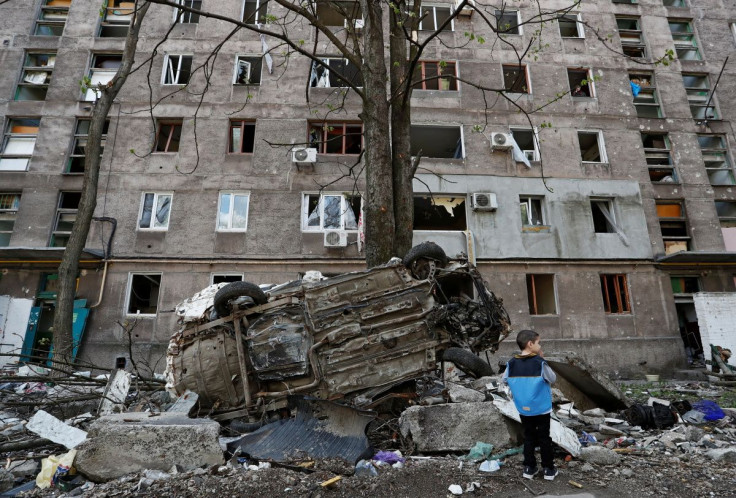U.S. Steps Up Military Aid For Ukraine During First Official Visit Since Invasion

Making the first official U.S. visit to Ukraine since Russia invaded two months ago, Washington's top diplomat and its defense secretary pledged additional military aid, including advanced weapons, and a return of U.S. envoys to Kyiv.
In a visit designed to show Western support, Secretary of State Antony Blinken and Secretary of Defense Lloyd Austin met Ukrainian President Volodomyr Zelenskiy and other top officials in Kyiv late on Sunday, after a train journey from Poland.
U.S. officials said the cabinet secretaries pledged new assistance worth $713 million for Zelenskiy's government and other countries in the region that are fearful of further Russian aggression.
The meeting between the U.S. delegation and Ukraine's leaders ran for three hours, or more than double the allotted time, a U.S. official said.
"We are inspired by the resilience of Orthodox Christians in Ukraine in the face of President Putin's brutal war of aggression," Blinken said earlier on Twitter, as fighting in the east overshadowed religious celebrations of Orthodox Easter.
Before the visit by Blinken and Austin, Ukrainian officials drew up a list of weapons urgently needed from the United States, such as anti-missile systems, anti-aircraft systems, armoured vehicles and tanks, Zelenskiy aide Igor Zhovkva told NBC News on Sunday.
The United States and NATO allies have shown growing readiness to supply heavier equipment and more advanced weapons systems. Britain has promised to send military vehicles and is considering supplying British tanks to Poland to free up Warsaw's Russian-designed T-72s for Ukraine.
The high level U.S. visit highlighted the shift in the conflict since Ukrainian forces, armed with a massive influx of weapons from the West, fought off a Russian assault on the capital Kyiv.
Russia has failed to capture any major city since the invasion started on Feb. 24, and having failed to take Kyiv, has concentrated its forces in the south and east, launching an offensive that Zelenskiy dubbed the battle of the Donbas.
In a daily update on the conflict, Britain's defence ministry said Russia had only made minor advances in some parts of Donbas.
"Without sufficient logistical and combat support enablers in place, Russia has yet to achieve a significant breakthrough," it said.
Reuters could not immediately verify the report by British military intelligence.
Earlier, in an emotional address at Kyiv's 1,000-year-old Saint Sophia Cathedral to mark the Orthodox Easter, Zelenskiy said his nation would overcome "dark times".
As a semblance of normal life returns to the capital, several countries have reopened embassies in recent days and some residents who fled the fighting returned for Easter.
U.S. diplomats will return to Ukraine in coming weeks, with Washington announcing a new ambassador.
"There's no substitute for that face-to-face engagement, and of course there is a symbolism to being back in the country," said a State Department official, who briefed reporters in Poland on condition of anonymity.
Some 320 kilometres (200 miles) southeast of Kyiv, Russian missile strikes on an oil refinery and power plant in Kremenchuk, killing one person and wounding seven, the governor of the Poltava region said.
Moscow, which describes its actions in Ukraine as a "special military operation", denies targeting civilians and rejects what Ukraine says is evidence of atrocities, saying Kyiv staged them to undermine peace talks.
The European Union is preparing "smart sanctions" against Russian oil imports, possibly some form of oil embargo, The Times reported https://www.thetimes.co.uk/article/brussels-prepares-to-hit-russia-with-smart-sanctions-on-oil-imports-k3f230l3j on Monday, citing the European Commission's executive vice president, Valdis Dombrovskis.
MARIUPOL "CRITICAL"
Pope Francis called for an Easter truce: "Stop the attacks in order to help the exhausted population. Stop," he said.
Ecumenical Patriarch Bartholomew, the spiritual head of Eastern Orthodox Christians worldwide, called for humanitarian corridors in Mariupol and other areas of Ukraine, where he said "an indescribable human tragedy is unfolding".
Ukrainian refugees filled churches across central Europe.
"I pray that this horror in Ukraine ends soon and we can return home," said Nataliya Krasnopolskaia, who fled to Prague from Odesa last month, one of more than 5 million Ukrainians estimated to have escaped the country.
Ukraine proposed on Sunday a "special" round of negotiations with Russia about the fate of civilians and Ukrainian troops still trapped in the southern city of Mariupol, the site of the biggest battle of the conflict. Moscow has yet to respond publicly.
After talking to Zelenskiy by telephone, Turkish President Tayyip Erdogan offered to assist in negotiations with Russia.
Russian forces on Sunday again attempted to storm the Azovstal steel plant, the main remaining Ukrainian stronghold in Mariupol, Ukrainian officials said, adding that more than 1,000 civilians are also sheltering there.
Serhiy Volyna, commander of Ukraine's 36th Marine brigade forces in Mariupol, said Russia was hitting the plant with air and artillery bombardments.
"We are taking casualties, the situation is critical... we have very many wounded men, (some) are dying ... the situation is rapidly worsening," Volyna said.
Moscow has previously declared victory in the city and said it did not need to take the steel plant.
Capturing Mariupol would link pro-Russian separatists who control parts of the regions of Donetsk and Luhansk that make up the Donbas with the southern Black Sea peninsula of Crimea, which Moscow seized in 2014.
Ukraine estimates tens of thousands of civilians have been killed in Mariupol and says 100,000 civilians are still in the city. The United Nations and Red Cross say the civilian toll is at least in the thousands.
© Copyright Thomson Reuters 2024. All rights reserved.





















